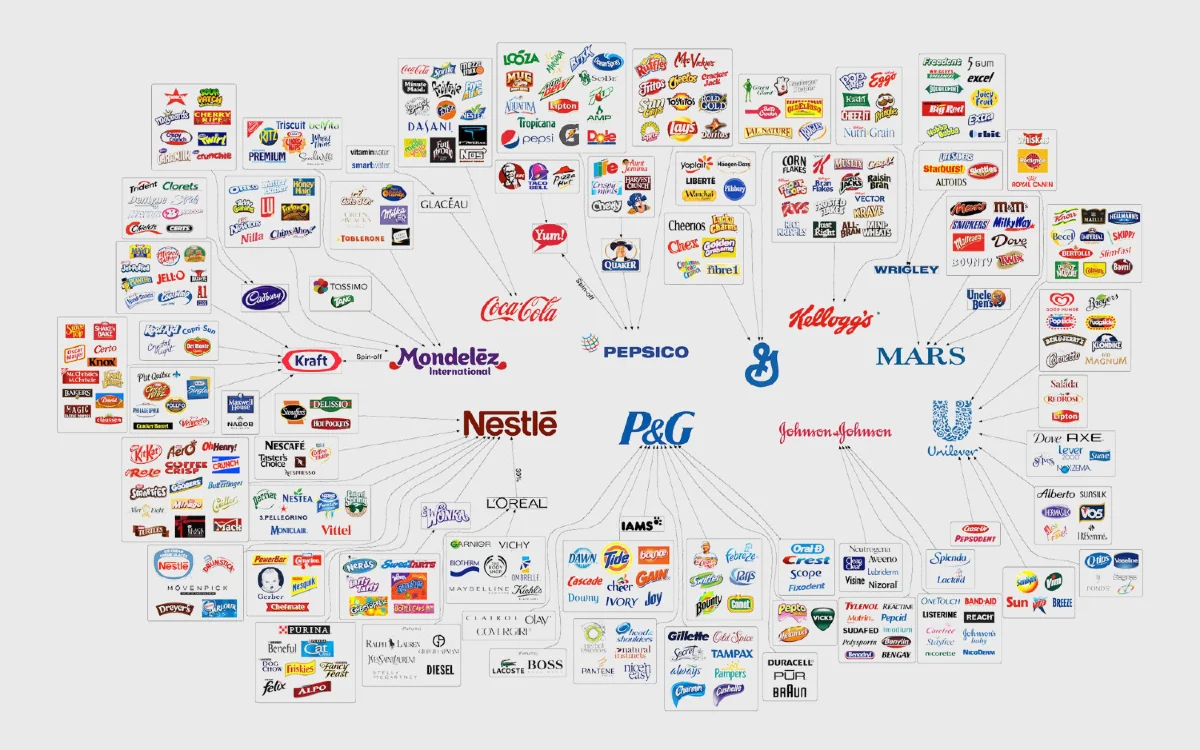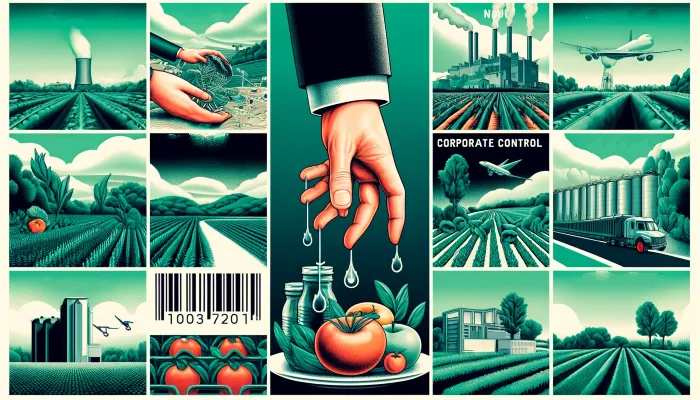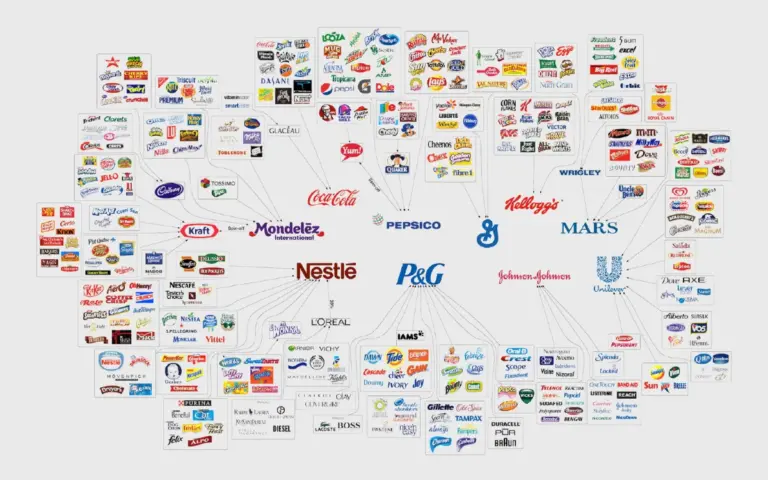Corporate food companies have been experiencing unprecedented profits in recent years, and it seems they have no intention of slowing down. While there has been a temporary relief in food inflation, the underlying issues that have driven prices up remain.
The small group of food corporations that dominate the industry have been capitalizing on supply chain disruptions, charging premiums for their products, and reaping record profits.
Between 2021 and 2022, the food and beverage industry amassed over $155 billion in profits, signaling the thriving state of food corporations.
Nestlé, the world’s largest food company, saw its gross profits rise by nearly 3 percent to $46 billion.
Cargill reported a significant 23 percent increase in revenue, reaching $165 billion, $6.68 billion of which constituted profit.
Tyson Foods, the leading meat producer in the United States, nearly doubled its profits in the first quarter of 2022 due to skyrocketing meat prices.
These profits are not just lining the pockets of corporate food executives and shareholders.
CEO salaries have seen substantial boosts, such as Tyson Foods’ CEO, whose salary increased by 33 percent to $12 million. Cargill distributed a record-breaking $1.21 billion to shareholders in its fiscal year 2022.
While supply chain disruptions caused by the pandemic, Russia’s conflict with Ukraine, and climate change have certainly impacted food prices, corporate profiteering plays a significant role. The cost increases associated with transportation, fuel, labor, and raw materials, combined with the surge in worker wages that have failed to keep up with inflation, have all been passed on to consumers, further inflating food prices.
In times of crisis and limited food supplies, people are often willing to pay a premium.
Additionally, high demand, driven partly by excess savings accumulated during the pandemic, has further contributed to the increase in food prices. Younger consumers, in particular, are increasingly willing to pay premium prices for ethically and sustainably produced foods.
However, the current price of food fails to reflect the true costs borne by future generations, the environment, and marginalized communities, such as farmworkers and low-income rural residents residing in heavily polluted agricultural areas.
Corporate food companies operate within a system that disregards these externalities and allows them to maximize profits at the expense of these stakeholders.
Recent analyses indicate that corporate profits accounted for 54 percent of food price increases between 2020 and 2021, whereas only 11 percent was attributed to labor costs in the preceding four decades. Instances of price gouging have also been observed, with companies raising prices to disproportionately high levels compared to the cost of production.
For example, during the avian influenza outbreak, Cal-Maine, the largest egg distributor in the U.S., significantly increased its gross profit margins, raising concerns of price gouging and collusion.
The hyper-concentration of the food sector exacerbates these issues.
Currently, only ten companies control over half of the market for nearly 80 percent of grocery items. These are names you most likely grew up with – Nestlé, Procter & Gamble, Unilever, The Coca-Cola Company, PepsiCo, Mars, Tyson, and General Mills, among others.
Moreover, food retailers, such as Walmart, Costco, Kroger, and Ahold Delhaize, hold a controlling stake of 65 percent of the market.
This concentration of power allows corporations to keep prices high, often in an implicit agreement with their competitors, particularly during emergencies like global food crises.
Addressing these challenges requires a comprehensive approach.
Legislation targeting concentration in the meatpacking industry, such as the Farm System Reform Act, has been introduced, but more concerted efforts are needed. Monitoring and investigating corporate profiteering, as well as ensuring fair pricing practices, should be prioritized.
Price-gouging laws should extend to upstream sectors (that is, goods that are used as inputs, such as fertilizer, oil, steel, and shipping materials), and the implementation of buffer stock reserves for essential supplies should be considered to mitigate future supply chain shocks.
Empowering workers and consumers is crucial in addressing the issue of corporate profiteering in the food industry. Strengthening labor rights, ensuring fair wages, and improving working conditions for agricultural workers can help mitigate the exploitation often associated with low-wage jobs in the sector.
Additionally, promoting transparency and providing consumers with accurate information about the true costs of production and the environmental and social impacts of different food choices can empower them to make informed decisions and support sustainable, fair food systems.

Government intervention and regulation are also essential.
Implementing antitrust measures to prevent excessive market concentration, enforcing fair pricing practices, and creating mechanisms to monitor and investigate corporate activities can help curb the excessive profiteering seen in the food industry.
Existing laws and regulations provide a framework to address corporate profiteering in the food industry, although their effectiveness in curbing such practices varies. One important aspect to consider is that there are currently no specific laws governing corporate pricing.
However, there are a set of antitrust laws aimed at addressing issues related to corporate conspiracy, collusion, and monopolization.
These laws include the Sherman Act, the Federal Trade Commission Act (which established the FTC), and the Clayton Act.
While these laws are in place, the enforcement and oversight by regulatory bodies such as the FTC have been limited, especially in the context of the corporate food sector.
This has allowed some corporations to engage in anticompetitive practices and exploit market conditions to their advantage.
To address these issues, Representative Jamaal Bowman (D-New York) introduced legislation last year that proposes the creation of a task force dedicated to monitoring price changes in food and other essential goods, as well as investigating corporate profiteering. This initiative aims to provide increased scrutiny and oversight of market activities, with a specific focus on identifying and addressing unfair pricing practices.
However, given the current political landscape with a GOP-controlled Congress, the likelihood of this legislation progressing significantly is uncertain.
Recognizing the need for action, some states are taking matters into their own hands. New York, for instance, has proposed rules against price gouging in the food industry. These proposed changes include measures to prohibit corporations with significant market shares from excessively increasing their profit margins during market disruptions.
By implementing these regulations, state authorities aim to prevent corporations from taking advantage of supply chain disruptions or other crises to unfairly inflate prices and maximize their profits.
A Frugal TikToker Shows Her Receipts And 50% Food Cost From 2021 to 2023
@amywaytosave Full vide0 & price comparison on my Y T! #inflation #groceryshopping #groceryprices #grocerypricetoohigh #inflationisreal #pricecomparison #10dollarmealchallenge ♬ original sound - darcy stokes
Kentucky-based TikToker Amy Way to Save (@amywaytosave) posted a video comparing the prices on a grocery run she did in 2020 with what the exact same items cost her now in 2023.
Amy purchased the exact products from Walmart in 2021, 2022 and 2023. With receipts as evidence, Amy shows how prices of even core staples (beans, rice, skim milk, Great Value frozen mixed veggies, etc.) have increased a massive 50% in 2023 from 2021.
More To Discover
It’s worth noting that while these efforts at the state and federal levels are steps in the right direction, there is still room for further development and improvement in terms of legislation and consumer protections. Continued advocacy, public pressure, and collaboration between lawmakers, regulatory agencies, and consumer advocacy groups are crucial for strengthening existing laws and implementing new measures that effectively address corporate profiteering and ensure fair pricing practices in the food industry.
Governments can also invest in research and development of sustainable agricultural practices, support small-scale farmers, and promote local food systems to diversify the market and reduce reliance on a few corporate players.
Furthermore, fostering collaboration between public and private sectors, civil society organizations, and academia is crucial for finding innovative solutions to address the systemic issues contributing to high food prices and corporate profiteering. By working together, stakeholders can explore alternative models of food production and distribution that prioritize sustainability, social equity, and affordability.
Simply put, while various factors contribute to high food prices, corporate profiteering plays a significant role in exacerbating the problem. The concentration of power in the hands of a few food corporations, coupled with supply chain disruptions and increased consumer demand, has allowed these companies to charge premium prices and reap record profits.
Addressing this issue requires a multifaceted approach that includes government regulation, empowering workers and consumers, and promoting sustainable and equitable food systems. By taking action, we can strive towards fairer and more accessible food for all.



















